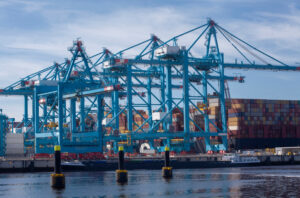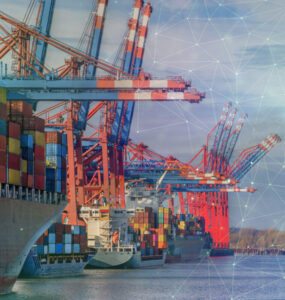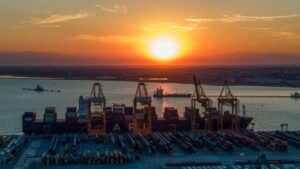• APM Terminals’ profits up $69 million, Maersk Line profits jump to $1.5 billion
In a statement, CEO Nils S. Andersen said the group achieved a total of US$4 billion in underlying earnings for 2013, $1 billion more than the corresponding period the previous year.
Positive growth was provided by improved volumes and unit cost reductions in Maersk Line, higher volumes for APM terminals and higher operational uptime for Maersk Drilling.
Danish shipping giant A.P Moller-Maersk has their annual report exceeding expectations despite a decline in Maersk Oil’s underlying profit.Maersk line made a profit of $1.5 billion, a huge increase compared to the $461 million gained in 2012. Return on invested capital was 7.4 percent.
Growth was attributed to better vessel networking efficiencies resulting in lower unit costs, supported by a lower bunker price – average freight rates decreased by $2,674 FFE, volume increased by 4.1 percent to 8.8 FFE whilst bunker consumption was reduced by 12.1 percent.
This has been provided by the addition of four triple-E container vessels. Each vessel is capable of holding 18,340 TEU.
Capacity is expected to grow exponentially over the coming years with an addition 16 Triple-E vessels on order, scheduled for a late 2014/early 2015 delivery.
APM Terminals experienced similar success. Profit rose by $69 million, at a total of $770 million annually. This can be accounted to the acquisition and co-controlling share of Global Ports Investments PLC., Russia in November 2012.
36.3 million TEU containers were handled annually through the companies ports and terminals, a three percent increase to the 35.4 million handled the year before.
The year comes to a close with the opening of the jointly owned Brasil Terminal Portuario in Santos, Brazil, alongside the start of the new Massvakte II terminal in the Netherlands.
APM to continue these high levels investments in 2014 with projects secured in Abidjan in the Ivory Coast and Izmir, Turkey.
Maersk had success in the majority of its subsidiary companies with Maersk Drilling, Maersk Supply Service, Svitzer and Dansk Supermarked Group (DSG) all seeing profit gains over the past year.
However this can not be said of Maersk Oil. Reductions in oil price alongside a drop in Maersk Oil’s share of production resulted in a total profit of $1 billion – $1.4 billion less than the year before.
Maersk Tankers suffered a similar fate, at a loss $317 million. This result was affected by impairment losses, provisions for onerous contracts and restructuring costs.
Damco were also not so lucky, with ROIC at negative 22 percent and loses of $111 million. This has been put down to significant business transformation costs and provisions.
Looking to the future the group predicts a significantly larger result than that of 2013, impacted by the sale of Dansk Supermarked Group, while the underlying result is expected to be in line with that of the previous financial year.
APM Terminals, Maersk Drilling and other shipping services are expected to improve, whilst Maersk line remains steady. However, gains in Maersk oil seem uncertain due to the current oil prices.








